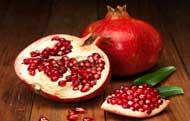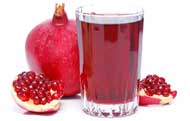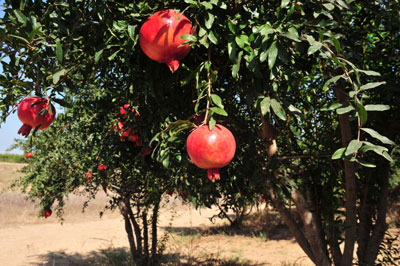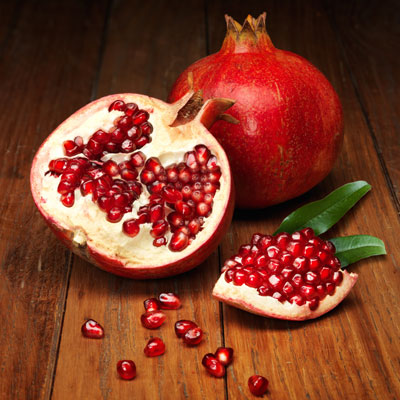





1. Pomegranate Facts
2. Types of Pomegranate
3. Nutritional Value of Pomegranate
4. Health Benefits of Pomegranate
The pomegranate (Punica granatum) is a fruit-bearing, deciduous shrub in the family Lythraceae, subfamily Punicoideae, that grows between 5 and 10 m (16 and 33 ft) tall. Rich in symbolic and mythological associations in many cultures, it is thought to have originated from Iran before being introduced and exported to other parts of Asia, Africa, and Europe, though also considered to be native to Indian Subcontinent (particularly Northern India) and Afghanistan.
The pomegranate and its juice are variously used in baking, cooking, juice blends, garnishes, non-alcoholic drinks, and cocktails.
History and Origin
Pomegranates originated in the region from Iran to northern India and have been cultivated for millennia, with archaeological evidence of domestication dating back to the 5th millennium BC. Their distribution expanded through the Middle East, the Mediterranean, and eventually to the Americas, where they were introduced by Spanish settlers in the late 16th century. Today, pomegranates are grown in many regions with suitable climates, including the Central Valley of California, Arizona, and parts of the Americas and the Mediterranean.
- • Wonderful
- • Elcite
- • Red Velvet™
- • Midnight Velvet™
- • Galusha Rosavaya
- • Jallore Seedless
- • Mollar de Elche
- • Parfianka
- • Ben Hur
- • Nana
Common pomegranate types sold and grown in Australia include 'Wonderful', 'Elcite', 'Red Velvet™', and 'Midnight Velvet™', along with other varieties like 'Galusha Rosavaya' and 'Jallore Seedless'. The most common are 'Wonderful', a productive variety with sweet arils, and 'Elcite', a Spanish variety with flavourful fruit.
Popular varieties
Wonderful: A very common, self-fertile variety known for its large, sweet fruit with red arils. It is well-suited to warm temperate and dry climates.
Elcite: A Spanish variety that produces medium-sized, flavour-packed fruit and does well in dry, warm climates.
Red Velvet™: A productive and self-fertile variety with attractive pinkish-purple skin and bright red flesh, suitable for various climates.
Midnight Velvet™: Another self-fertile variety that is a popular backyard Favorite, featuring deep purple skin and dark red flesh. It can be grown from cool temperate to sub-tropical areas.
Other varieties available
Galusha Rosavaya: A locally available variety with good flavour.
Jallore Seedless: A seedless variety.
Mollar de Elche: Another Spanish variety.
Parfianka: A dwarf variety with early-season fruit, ideal for Mediterranean and arid climates.
Ben Hur: Known for producing very large, sweet, and juicy fruit.
Nana: A compact variety that stays around 1 meter tall, making it ideal for pots.
Fruit ” Pomegranate ” ( Nutritional value )
Nutritional value per 100 g
Pomegranates, raw
|
Nutrient ( Proximate’s )
|
Unit
|
Value
|
Daily Value %
|
|
Energy
|
kcal
|
83
|
4.1%
|
|
Protein
|
g
|
1.67
|
3.3%
|
|
Total lipid (fat)
|
g
|
1.17
|
1.8%
|
|
Carbohydrate, by difference
|
g
|
18.70
|
6.8%
|
|
Fiber, total dietary
|
g
|
4.0
|
14.2%
|
|
Sugars, total
|
g
|
13.67
|
|
|
Minerals
|
|||
|
Calcium, Ca
|
mg
|
10
|
0.7%
|
|
Iron, Fe
|
mg
|
0.30
|
1.6%
|
|
Magnesium, Mg
|
mg
|
12
|
2.8%
|
|
Phosphorus, P
|
mg
|
36
|
2.8%
|
|
Potassium, K
|
mg
|
236
|
5%
|
|
Sodium, Na
|
mg
|
3
|
0.1%
|
|
Zinc, Zn
|
mg
|
0.35
|
3.1%
|
|
Copper, Cu
|
mg
|
0.158
|
17.5%
|
|
Manganese, Mn
|
mg
|
0.119
|
5.1%
|
|
Selenium, Se
|
µg
|
0.5
|
0.9%
|
|
Vitamins
|
|||
|
Vitamin C, total ascorbic acid
|
mg
|
10.2
|
11.3%
|
|
Thiamin (B-1)
|
mg
|
0.067
|
5.5%
|
|
Riboflavin (B-2)
|
mg
|
0.053
|
4%
|
|
Niacin (B-3)
|
mg
|
0.293
|
1.8%
|
|
Pantothenic acid (B-5)
|
mg
|
0.377
|
7.5%
|
|
Vitamin B-6
|
mg
|
0.075
|
4.4%
|
|
Vitamin B-12
|
mg
|
0.00
|
|
|
Folate (B-9)
|
µg
|
38
|
9.5%
|
|
Vitamin A, IU
|
IU
|
0
|
0
|
|
Vitamin E (alpha-tocopherol)
|
mg
|
0.60
|
4%
|
|
Vitamin D
|
IU
|
0
|
|
|
Vitamin K (phylloquinone)
|
µg
|
16.4
|
13.6.%
|
|
Lipids
|
|||
|
Saturated Fatty Acids
|
g
|
0.120
|
0.6%
|
|
Monounsaturated Fatty Acids
|
g
|
0.093
|
|
|
Polyunsaturated Fatty Acids
|
g
|
0.079
|
|
|
Trans Fatty Acids
|
g
|
0.000
|
|
|
Carotenoids
|
|||
|
Beta-Carotene
|
µg
|
0
|
|
|
Beta-Cryptoxanthin
|
µg
|
0
|
|
|
Lutein + zeaxanthin
|
µg
|
0
|
|

|
Reference Values are based on a 2,000 Calorie Intake, for Adults and Children 4 or More Years of Age. Your daily values may be higher or lower depending on your calorie needs.
|
|
Percentages are roughly approximated using (RDA) Recommended Dietary Allowances for adults. Source: USDA United States Department of Agriculture
|
|
Reference Values for Nutrition – FDA U.S. Food and Drug Administration
|
Pomegranate Nutritional Value
Pomegranates offer numerous health benefits due to their rich antioxidant and nutrient content, including supporting heart health by lowering blood pressure and cholesterol, reducing inflammation, and protecting against cell damage. They may also improve memory, boost the immune system, aid digestion, and have anti-cancer properties. Pomegranates contain beneficial compounds like punicalagins and flavonoids, and eating the whole seeds provides fiber and high amounts of vitamin C.
Other benefits not listed on table below;
Supports urinary health - Pomegranate supports urinary health by potentially reducing kidney stone formation due to its antioxidant and anti-inflammatory properties that may prevent bacteria from adhering to the bladder wall. It may help by regulating the concentration of minerals like calcium and oxalate in the body, which are major components of kidney stones.
- BRAIN AND COGNITIVE HEALTH
Pomegranates may support brain and cognitive health due to their high antioxidant and anti-inflammatory polyphenol content. Studies suggest pomegranates can improve memory and cognitive function by protecting neurons, reducing neuroinflammation, and promoting the removal of damaged mitochondria. However, more long-term research is needed, particularly in human clinical trials. - CANCER PREVENTION
The pomegranate has been used for the prevention and treatment of a multitude of diseases and ailments for centuries in ancient cultures. Pomegranate exhibits strong antioxidant activity and is a rich source of anthocyanins, ellagitannins, and hydrolysable tannins. Studies have shown that the pomegranate fruit as well as its juice, extract, and oil exert anti-inflammatory, anti-proliferative, and anti-tumorigenic properties by modulating multiple signalling pathways, which suggest its use as a promising chemo preventive/chemotherapeutic agent. - POMEGRANATE IS A POTENT ANTIOXIDANT
Pomegranates are potent antioxidants due to their high concentration of polyphenols like ellagitannins and anthocyanins. These compounds are powerful at combating oxidative stress and have been shown to be superior to other antioxidants in protecting cells from damage, which may contribute to cardiovascular health and other benefits. - REDUCES CHRONIC INFLAMMATION
Pomegranate reduces chronic inflammation due to its high antioxidant content, which protects cells from damage. Key compounds like punicalagin and ellagitannins have been shown to have anti-inflammatory effects and may help regulate inflammatory pathways in the body. This makes pomegranate beneficial for managing various inflammatory conditions like inflammatory bowel disease (IBD), rheumatoid arthritis, and cardiovascular diseases. - SUPPORTS CIRCULATION
Pomegranate supports circulation because it is rich in antioxidants and nitrates, which help dilate blood vessels, improve blood flow, and increase oxygen delivery to your body's tissues. This can help lower blood pressure and support overall cardiovascular health.

- HEART HEALTH
Pomegranates benefit heart health due to their high antioxidant content, which helps protect against plaque build-up and may lower blood pressure and inflammation. They are rich in polyphenols, including punicalagin and anthocyanins, which can reduce oxidative stress on blood vessels and improve blood flow. Pomegranate juice can also increase the activity of an enzyme that breaks down oxidized lipids in the arteries. - BOOSTS IMMUNITY
Pomegranates boost immunity through their rich content of antioxidants, vitamins like C, and anti-inflammatory compounds, which support immune cell function, antibody production, and protection against pathogens. They help the immune system by fighting oxidative stress, reducing inflammation, and promoting a healthy gut, which is crucial for overall immune health. - AIDS DIGESTION
Pomegranates aid digestion by being high in fiber, which promotes regular bowel movements and prevents constipation. They also contain prebiotics that support a healthy gut microbiome and polyphenols that can help reduce inflammation in the digestive tract. - ENHANCES EXERCISE PERFORMANCE
Pomegranate enhances exercise performance due to its polyphenols and nitrates, which improve blood flow, oxygen delivery, and muscle recovery. Studies suggest it can improve endurance, strength, and help with post-exercise soreness, though more research is needed for conclusive evidence. Pomegranate extract in supplement form has shown promise in improving performance in various exercises, including time trials and repeated sprints. - FIGHTS FREE RADICALS
Pomegranates fight free radicals due to their high content of potent antioxidants like punicalagins and anthocyanins, which protect cells from damage and reduce oxidative stress. These compounds neutralize unstable molecules called free radicals, and some also help decrease inflammation and protect against cellular damage, making pomegranates a heart-healthy fruit that can reduce LDL ("bad") cholesterol oxidation.
References
Nutrient Database – USDA (United States Department of Agriculture)
Reference Values for Nutrition – FDA U.S. Food and Drug Administration
Heart health - Pomegranates benefit heart health due to their high antioxidant content, which helps protect against plaque buildup and may lower blood pressure and inflammation. They are rich in polyphenols, including punicalagin and anthocyanins, which can reduce oxidative stress on blood vessels and improve blood flow. Pomegranate juice can also increase the activity of an enzyme that breaks down oxidized lipids in the arteries.
Supports circulation - Pomegranate supports circulation because it is rich in antioxidants and nitrates, which help dilate blood vessels, improve blood flow, and increase oxygen delivery to your body's tissues. This can help lower blood pressure and support overall cardiovascular health.
Fights free radicals - Pomegranates fight free radicals due to their high content of potent antioxidants like punicalagins and anthocyanins, which protect cells from damage and reduce oxidative stress. These compounds neutralize unstable molecules called free radicals, and some also help decrease inflammation and protect against cellular damage, making pomegranates a heart-healthy fruit that can reduce LDL ("bad") cholesterol oxidation.
Reduces chronic inflammation - Pomegranate reduces chronic inflammation due to its high antioxidant content, which protects cells from damage. Key compounds like punicalagin and ellagitannins have been shown to have anti-inflammatory effects and may help regulate inflammatory pathways in the body. This makes pomegranate beneficial for managing various inflammatory conditions like inflammatory bowel disease (IBD), rheumatoid arthritis, and cardiovascular diseases.
Brain and cognitive health - Pomegranates may support brain and cognitive health due to their high antioxidant and anti-inflammatory polyphenol content. Studies suggest pomegranates can improve memory and cognitive function by protecting neurons, reducing neuroinflammation, and promoting the removal of damaged mitochondria. However, more long-term research is needed, particularly in human clinical trials.
Cancer prevention - The pomegranate (Punica granatum L.) fruit has been used for the prevention and treatment of a multitude of diseases and ailments for centuries in ancient cultures. Pomegranate exhibits strong antioxidant activity and is a rich source of anthocyanins, ellagitannins, and hydrolysable tannins. Studies have shown that the pomegranate fruit as well as its juice, extract, and oil exert anti-inflammatory, anti-proliferative, and anti-tumorigenic properties by modulating multiple signalling pathways, which suggest its use as a promising chemo preventive/chemotherapeutic agent.
Boosts immunity - Pomegranates boost immunity through their rich content of antioxidants, vitamins like C, and anti-inflammatory compounds, which support immune cell function, antibody production, and protection against pathogens. They help the immune system by fighting oxidative stress, reducing inflammation, and promoting a healthy gut, which is crucial for overall immune health.
Aids digestion - Pomegranates aid digestion by being high in fiber, which promotes regular bowel movements and prevents constipation. They also contain prebiotics that support a healthy gut microbiome and polyphenols that can help reduce inflammation in the digestive tract.
Enhances exercise performance - Pomegranate enhances exercise performance due to its polyphenols and nitrates, which improve blood flow, oxygen delivery, and muscle recovery. Studies suggest it can improve endurance, strength, and help with post-exercise soreness, though more research is needed for conclusive evidence. Pomegranate extract in supplement form has shown promise in improving performance in various exercises, including time trials and repeated sprints.
Supports urinary health - Pomegranate supports urinary health by potentially reducing kidney stone formation due to its antioxidant and anti-inflammatory properties that may prevent bacteria from adhering to the bladder wall. It may help by regulating the concentration of minerals like calcium and oxalate in the body, which are major components of kidney stones.
Pomegranate is a potent antioxidant - Pomegranates are potent antioxidants due to their high concentration of polyphenols like ellagitannins and anthocyanins. These compounds are powerful at combating oxidative stress and have been shown to be superior to other antioxidants in protecting cells from damage, which may contribute to cardiovascular health and other benefits.
